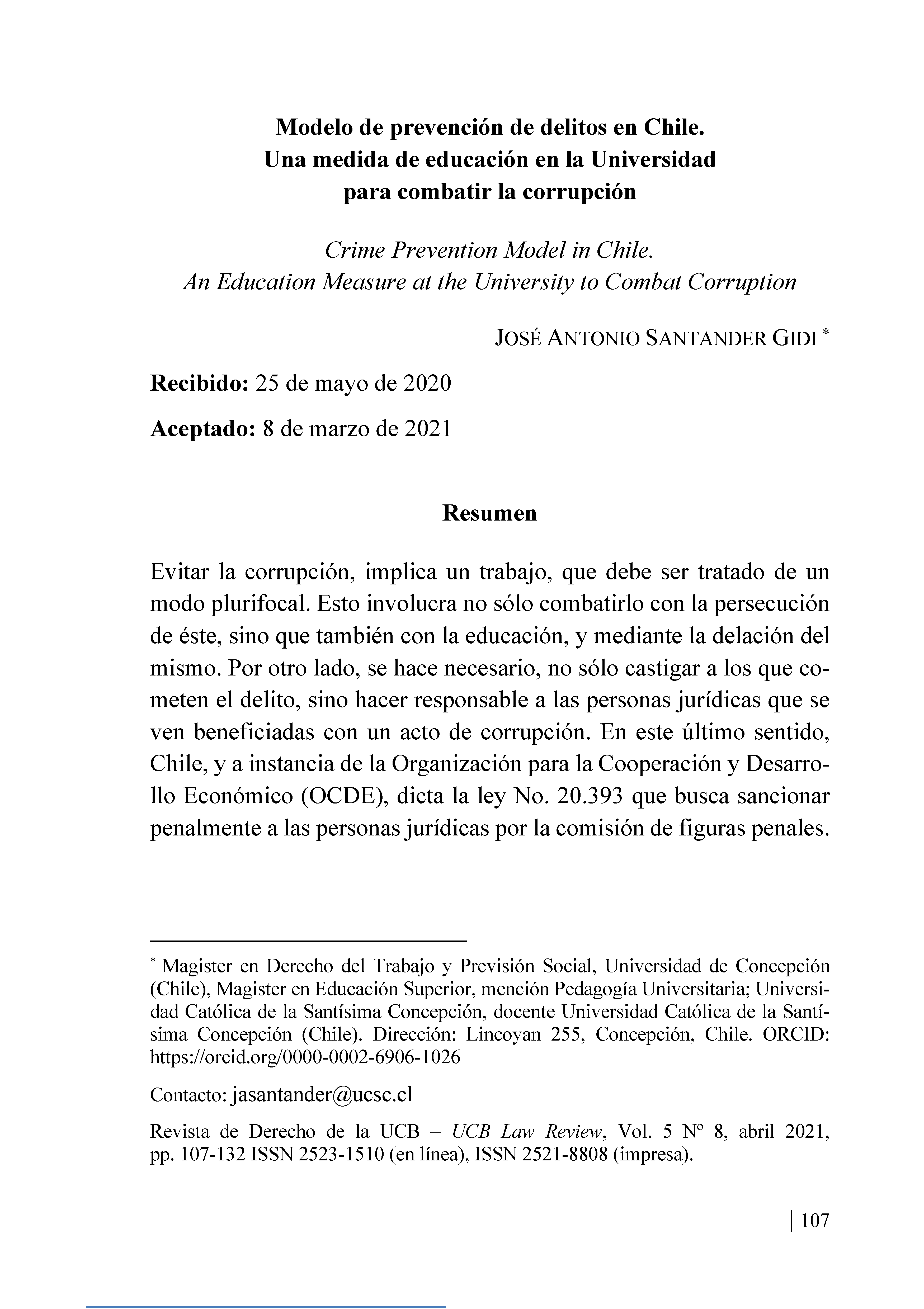Crime Prevention Model in Chile. An Education Measure at the University to Combat Corruption
DOI:
https://doi.org/10.35319/lawreview.2021860Keywords:
criminal responsibility, legal persons, corruption, crime prevention model, universitiesAbstract
Avoiding corruption implies work, which must be treated in a multifocal way, and involves fighting it with its persecution and education by denouncing it. On the other hand, it is necessary to punish those who commit the crime and hold accountable the legal entities that benefit from an act of corruption. In this last sense, Chile, at the request of the Organization for Economic Cooperation and Development (OECD), dictates Law No. 20,393 that seeks to penalize legal persons for the commission of criminal offenses. However, this law's novelty is the creation of a preventive model to reduce liability. This model includes education and the obligation to report knowledge of the commission of crimes. Universities, as legal entities and especially as educational institutions for future professionals in the country, must be prepared, on the one hand, not to be used as instruments by third parties for the commission of crimes of money laundering, financing of terrorism, illicit association, bribery, reception, among others, whose common denominator is corruption, and on the other hand, this model allows students to participate, from their training, in the mechanisms aimed at preventing corruption crimes from going unpunished.
Downloads
References
Abdelnour, R. (2012). Innovación Educativa en la Enseñanza y Aprendizaje del Derecho. Saarbrücken: Editorial Académica Española, Lap Lambert Academic Publishing GmbH & Co. KG.
Artaza, O. (2013). Sistemas de prevención de delitos o programas de cumplimiento. Breve descripción de las reglas técnicas de gestión del riesgo empresarial y su utilidad en sede jurídico penal. Disponible en: https://scielo.conicyt.cl/scielo.php?script=sci_arttext&pid=S0718-33992013000200006. (Consultado el 22 de mayo de 2020)
Centro Interuniversitario de Desarrollo (CINDA), (2016). Calidad de la formación universitaria. Información para la toma de decisiones. Lemaitre, M. y López, M. (eds). Santiago, Chile: Centro Interuniversitario de Desarrollo.
Centro Interuniversitario de Desarrollo (CINDA), (2019). Diversidad, autonomía, calidad. Desafíos para una educación superior para el siglo XXI. Lemaitre, M. (ed). Santiago, Chile: RIL Editores.
Díaz, C. (2014). “Un acercamiento a la comprensión del método de investigación en ciencias sociales y jurídicas: el recorrido desde la naturaleza humana, los paradigmas y su método, en un contexto disciplinar dominado por la racionalidad teleológica”. En: Revista Pedagogía Universitaria y Didáctica del Derecho. Santiago: Unidad de Pedagogía Universitaria y Didáctica del Derecho, Universidad de Chile, N°2, vol. 1, 2° semestre, 80 – 104. [consulta: 9 de enero de 2018]
Palma, J. (2014). “Procedimientos operativos estandarizados y responsabilidad penal de la persona jurídica”. Disponible en: http://ebookcentral.proquest.com/lib/sibucsclsp/detail.action?docID=3227409. Pág. 158. (Consultado el 15 de mayo del 2020)
Hernández, R., Fernández, C. y Baptista, M. (2014). Metodología de la Investigación. México: McGraw-Hill. ISBN 978-1-45622396-0
Navas, I. y Jaar, A. (2018). La responsabilidad penal de las personas jurídicas en la jurisprudencia chilena. Política criminal. Disponible en: https://dx.doi.org/10.4067/S0718-33992018000201027. (Consultado el 15 de mayo del 2020)
Nieto, M. (2014). Public Compliance: prevención de la corrupción en administraciones públicas y partidos políticos. Ediciones de la Universidad de Castilla-La Mancha. Disponible en: http://ebookcentral.proquest.com/lib/sibucsclsp/detail.action?docID=4776184. pág. 43. (Consultado el 14 de mayo de 2020)
Rosal, B. (2018). Manual de responsabilidad penal y defensa penal corporativas. España.: Wolters Kluwer Disponible en: http://ebookcentral.proquest.com/lib/sibucsclsp/detail.action?docID=5759384. Pág. 159. (Consultado el 14 de mayo del 2020)
Salinas, D. (2014). El ADN del dato cuantitativo. Su sentido y construcción en investigación social y educacional. Valparaíso: Ediciones Universitarias de Valparaíso, Pontificia Universidad Católica de Valparaíso.
Van Weezel, A. (2010). Contra la responsabilidad penal de las personas jurídicas. Política criminal. Disponible en: https://dx.doi.org/10.4067/S0718-33992010000100003. (Consultado el 15 de mayo del 2020)

Downloads
Published
How to Cite
Issue
Section
License
The U.C.B. Law Review is an Open Access Journal, therefore, it is full free for access, reading, search, dowload, distribution and lawfull reuse in any medium only for non-comercial purposes, provided the original work is properly cited.








